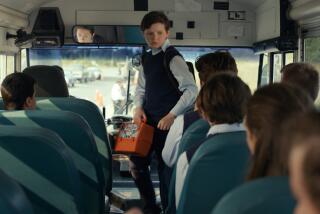Fox finds itself in a cartoon family way
- Share via
When “Family Guy” was delivered from extinction two years ago by zealous fans and ambitious executives at Fox, it went largely unquestioned why the show had failed at all on a network that had successfully nurtured “The Simpsons.” Even at its best, though, “Family Guy” wasn’t much more than a slapstick version of “The Simpsons,” with a nasty-talking baby, Stewie, replacing a silent one, Maggie. The rest of the Griffin family felt familiar -- Peter, the bumbling dad; Lois, the well-meaning but frazzled mom; Meg, the too-smart daughter (though not as smart as Lisa Simpson); and Chris, the delinquent son (though not as much so as Bart). The show quickly ossified, though, thanks to its particular brand of hyperlink humor, relying heavily on quick cuts to tangential jokes steeped in pop ephemera. The sharp clips almost overshadowed the rest of the show’s writing.
Tonight’s sixth-season premiere is one of the better recent episodes, largely because it’s almost entirely an aside. Show creator Seth MacFarlane has been known to drop “Star Wars” references into his scripts; tonight’s episode is completely “Star Wars”-themed (and George Lucas-approved). Though in one sense it’s a cop-out -- this episode has to do no work whatsoever toward answering larger questions about the Griffin family -- it also plays to the show’s strengths.
“Star Wars” nitpickers will appreciate the handful of punch lines that explicitly address odd moments in the original film. (If you’ve ever wondered why elevated platforms inside the Death Star have no railings, this is the satire for you.) Even the asides-within-an-aside -- bits about Grey Poupon, dot-matrix printers and “Deal or No Deal” -- are funny and efficient.
And what’s more, it seems that “Family Guy” is beginning to peer at itself in the mirror. After the “Star Wars” storytelling arc is completed tonight, the Griffins can’t get past Chris’ main concern: “Didn’t ‘Robot Chicken’ already do this three months ago?” A note of self-doubt, maybe, masking as self-awareness.
In 2005, MacFarlane used his “Family Guy” capital to launch a second show, “American Dad!,” an extended riff on the bizarrely drawn household. Stan Smith, the patriarch, is a wide-jawed CIA employee with one great burden -- his family. His wife, Francine, is needy; his son, Steve, a wimp; and his daughter, Hayley -- gasp -- a liberal. A talking fish, Klaus, and a domesticated alien, Roger, round out the household.
On the third-season’s premiere, which airs a week from tonight, the Smiths learn that every family vacation they’ve taken has actually been a computer-program experience, “Matrix”-like, while they’ve been suspended in CIA-issued goo by Stan.
“That time in Mexico when you and I went hang gliding and you told me you loved me?” Steve asks.
“Neither of those things ever happened,” Stan replies.
As a G-man, Stan is predictably blustering. He’s loyal to his country and its Republican leaders -- a stand-in for blind jingoism, an easy punch line for audiences on their fourth consecutive half-hour helping of left-minded sketch yuks. (“Family Guy” and “American Dad!” are beginning to echo their lead-ins, “The Simpsons” and “King of the Hill”: the former rote in its cuteness, and the latter growing increasingly subversive over time. In the case of each pair, the cult may have formed around the wrong show.)
Early on, political friction between Stan and his daughter were key to the show’s comedic dynamic. But his parenting foibles have proven far more durable. As a father, he’s preposterous and engaging. He’s a brute, utterly unable to see his family for the complex individuals that they are. And as this is a cartoon, he never has to grow up, meaning there’s hope for many more misunderstandings to come.
More to Read
The complete guide to home viewing
Get Screen Gab for everything about the TV shows and streaming movies everyone’s talking about.
You may occasionally receive promotional content from the Los Angeles Times.






